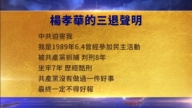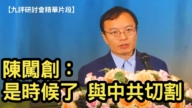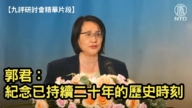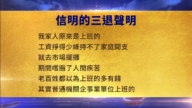【新唐人2014年09月06日讯】不久前,才以“慢慢懂”引爆媒体热炒的中共纪委书记王岐山,又发出惊人之语。在大陆政协常委会上,他不仅脱稿演讲,而且在回答政协委员的提问时说,宁愿官员不作为,也不可乱作为。各级中共官员们吃着公粮,为什么高层却宁愿他们不作为?这又反应出在目前的反腐中,中共官场的什么状况?请看各方人士的解读。
在中共政协常委25号的会议上,有政协常委提问:现在很多公务员都不敢做事,主要怕做错事,怎么办?王岐山回复说:的确有一些消极、不作为的情况出现了,但是“宁愿(官员)不作为,也不可乱作为。”他强调,“乱作为”是绝不能容忍的。
此前,王岐山面对拿下周永康后是否还抓更大“老虎”的提问,回答说“以后你就慢慢懂”,已经引发国际中文媒体的大量分析评论。
而中纪委到7月底,已经查处了违规案件5万1600起,处理的党员、官员有6万7679人,超过去年全年的总数。开通一年整的中纪委监察部网站,实名注册的中国公民就已超过1万5千人,留言4万多条,平均每天收到贪腐举报超过800件。但访民们说这还只是冰山一角。
时事评论员杰森博士:“底下官员问的这个话,事实上是给王岐山提醒,‘你要是这样做我们就做不了了’。那么王岐山的回答,是一种很不成逻辑的无奈之言。但是这是官场现实。如果官员根本就拿着国家的收入不干活、唯恐他干错事,最好的办法就是不要任何官员。”
大陆所谓的“反腐风暴”,从十八大以来,没有停歇的迹象,反而级别愈打愈高。近日山西从省委书记到省委常委,多位省部级高官落马。各地各级官员大多人人自危提心吊胆。
但民间有另外一种担心的声音,就是现在官员们虽然一时被吓住,但“贼心”不死,等以后环境宽松了,很可能会变本加厉,弥补这段时间的所谓“损失”。
原山东大学教授孙文广:“这个反腐到现在没有从制度面上来进行一些改革,要深入下去就很难了,抓几个贪官是很难搞得彻底。它有可能在一时之间起到一些震摄的作用。要有民主制度,官员要选举,官员财产要公示,这些制度要确立下来,在很大程度上杜绝贪腐。”
杰森:“所有的历史上没有从上往下能管住所有官员不贪污。毕竟上面是很少的眼睛,底下的官员是众多的,所以说没有一个正常的让老百姓监督的机制,透明的媒体运作方式,司法也不独立,这是不可能根本解决整个中国官场腐败的问题。”
大陆民间多年前就流传着“邓小平的官员百万富翁,江泽民的官员腐败成风”的民谣,暗指中共前党魁江泽民推动了中共官员的整体腐败。另有学者指出,江泽民打压一亿信仰“真善忍”的中国主流民众,也加速了中国社会的道德堕落。
杰森赞同这一观点,他举例说:江泽民是在“六四”后上台,“六四”时抗议的学生喊出的口号是“反官倒、反腐败”,这就说明当时老百姓不接受“官倒”和“腐败”。但是在江泽民掌权的十年后,全国上下观念改变成了“你如果当官却不腐败你就太傻了”。
杰森:“整个全民道德标准扭曲了,这是他主要的一个作用。江泽民他一手提拔上来的人,其实都是腐败的标竿。不管是周永康,还是曾庆红。腐败是他控制整个中国官场一个最基本的方式。”
到截稿时为止,到海外《大纪元》网站,宣布退出中共党、团、队的人数已经超过1亿7千6百21万人次。大量“三退”民众留言表示,大陆官场的严重贪腐,是他们看清中共、彻底失望的直接原因之一。
采访编辑/唐音 后制/萧宇
Wang Qishan Remarks, “Non-Performing Officials"
Central Commission for Discipline Inspection (CCDI) Secretary
Wang Qishan once again gave a surprising remark:
Rather the officials not performing than behaving badly.
This was heard in a Q&A session following an impromptu
speech at the CPPCC (Chinese People’s Political
Consultative Conference) meeting.
What makes the Communist regime prefer harboring
non-performing officials on taxes?
What does it say about the anti-graft campaign in China?
The followings are interpretation of all parties.
In the CPPCC meeting on the 25th August, questions of many
civil servants fears of wrong doing and having nothing done
about it were brought up.
Wang Qishan replied: Indeed, passive and inactive situations
arises, but rather no action than bad behavior.
He stressed bad behavior is absolutely intolerable.
Previously, his comment, “you’ll slowly understand" was
widely heard on international Chinese media when
Wang Qishan answered the question of whether there is
a bigger tiger beyond Zhou Yongkang.
By the end of July, CCDI has processed 51,600 violation cases
and 67,679 officials.
That’s more than the total of last year.
Since the opening of the CCDI public Website more than a year
ago, 15,000 Chinese have registered on the site with real names,
and left more than 40,000 messages.
That is more than 800 reports a day.
Petitioners commented that this is just the tip of the iceberg.
Commentator Dr. Jie Sen: This question was in fact to remind
Wang Qishan, we can’t do anything with what you are doing.
Wang Qishan’s answer was illogical but lack of better choice.
It is the reality in the Communist regime.
If the officials were paid to do nothing,
the best choice would be no officials.
The so-called anti-graft has no sign of stopping since
the 18th National Congress.
The level involved is getting higher.
In Shanxi, many provincial and ministerial
level officials were sacked.
Officials at all levels are nervous.
What worries the people now is that officials might get
intimidated now, but once the situation was relaxed,
they will strike back to make up the “loss" during this time.
Former Shandong University professor Sun Wenguang:
As long as the anti-corruption does not change the system,
it is difficult to go deep.
Tackling a few corrupt officials will not have a thorough
effect other than a temporary shock.
Only with democracy, election, and property declaration,
will the system prevent corruption.
Jie Sen: Throughout history, top down
can never block corruption.
There are fewer eyes to monitor the many officials.
Without an oversight mechanism by the people, the transparent
media, and an independent judiciary, there is no way
to fundamentally solve corruption in the regime.
A popular ballad was heard years ago, “Deng Xiaoping’s
officials were millionairs, Jiang Zemin’s officials were
rampantly corrupt," alluding that Jiang Zemin promoted the
entire corrupt CCP officials.
There are scholars pointing out that Jiang Zemin’s suppression
of 100 million faithful Falun Gong practitioners holding
“Truthfulness, Compassion, Tolerance’ has also accelerated
the moral degeneration of Chinese society.
Jie Sen agrees with this view. He explains, Jiang Zemin took
office after the 1989 June 4 massacre.
The 1989 student movement was for “anti-profiteering,
anti-corruption," which indicates people
rejected “profiteering" and “corruption."
But, after a decade of ruling by Jiang Zemin,
the concept has changed.
It became, “Being an official,
you are too stupid not to be corrupt."
Jie Sen: His main function has been to distort the entire
ethical standards in China.
Jiang Zemin’s hand-picked people have all served as the
corrupt benchmark, such as Zhou Yongkang and Zeng Qinghong.
Corruption is his most basic rule to control
the Chinese officialdom.
To date, more than 176.21 million Chinese have denounced
the Chinese Communist Party (CCP) and its associated
organizations through the Epoch Times website.
A large number of them expressed their reasons to quit the CCP
on the website.
The serious corruption in mainland officialdom is one of the
direct causes for them to see through the CCP
and completely lose hope in the CCP.
Interview & Edit/TangYin Post-Production/XiaoYu





























